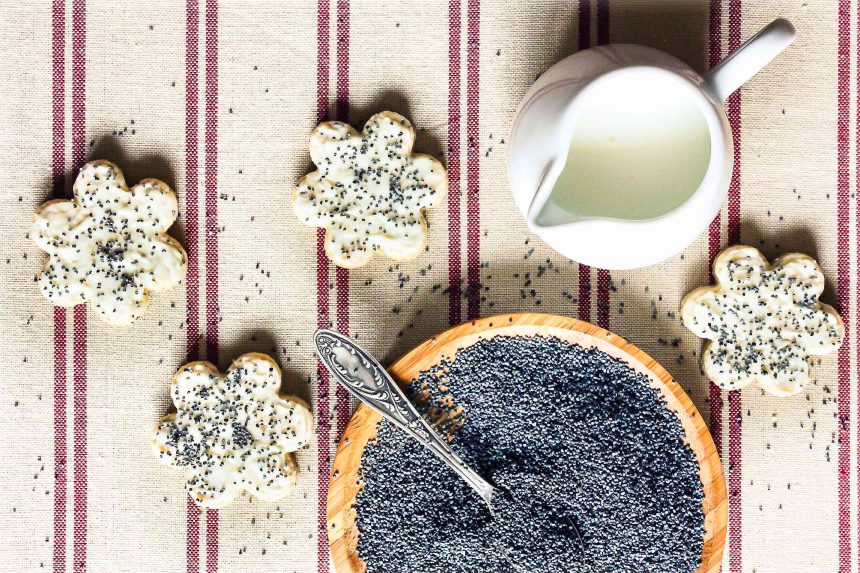How to eat poppy seeds? Let us count the ways! While it’s tempting to sideline this familiar seed to bagel topping terrain (and don’t get us wrong, we love them scattered over this delicious carb) nutritionally dense poppy seeds are capable of much more, from zipping up the flavor of soups and noodle dishes to taking center stage in baked treats. We connected with spice experts to get the scoop on this tiny but mighty ingredient.
- Alyse Baca, culinary director, Spicewalla, a chef-founded brand specializing in small-batch spices, herbs, and blends
- Jennifer Kellison, director of innovation, Frontier Co-op and Simply Organic, brands offering premium extracts, flavorings, and spices
What Are Poppy Seeds?
Poppy seeds come from the opium poppy (or breadseed poppy), a flowering plant likely indigenous to lower Mesopotamia (Southwest Asia). These kidney-shaped, speck-sized dried seeds have no narcotic effects; the opium is no longer present once the seeds are formed. Considered a seed and a spice, poppy seeds have been cultivated since at least the sixth century. Today, the world’s largest producers include the Czech Republic, Turkey, Spain, Hungary, and France.
Color: When you think of poppy seeds, your mind likely fades to black, but they come in a veritable rainbow of colors, depending on where they’re cultivated. “There are several varieties of poppy seeds including blue, white, yellow, brown, and black,” says Jennifer Kellison, director of innovation at Frontier Co-op and Simply Organic, brands offering premium spices, seasonings, extracts, and flavorings.
Types: Kellison notes that the most common type in the U.S. is the blue poppy seed (botanical name, Papaver Somniferum), sometimes called Dutch Blue when sourced from Holland or Canada. “Blue poppy seeds are the most well-known and widely used variation, but they are actually less commonly found in nature compared to other types,” adds Alyse Baca, culinary director of Spicewalla, a brand specializing in small-batch herbs, spices, and blends. Though more prevalent, black and white poppy seeds are less popular.
Nutritional Benefits
Like other seeds, from hemp and sesame to flax and chia, poppy seeds are nutritionally beneficial, packed with fiber, plant fats, protein, and micronutrients, including copper, manganese, iron, zinc, calcium, and phosphorous. Cold-pressed poppyseed oil, made from the seeds, boasts omega-6 and omega-9 healthy fats.
How to Eat Poppy Seeds
Rachel Marek
Poppy seeds take the cake in terms of utility. “Poppy seeds can be used in both sweet and savory dishes to add a nutty flavor and texture to the cuisine. You can use them whole, ground, or pressed into oil,” Kellison says. They can also be implemented as a spice, an ornamentation, or as distinctive fillings.
Crunchy Topping
Bagels and other baked goods dusted with just the seeds or a pinch of everything spice blends are a tasty entry point for experiencing poppy seeds. “Poppy seeds add a great crunchy texture to a bagel as well as visual appeal,” Bawa says. “Their mild, nutty flavor really complements and enhances flavors without overwhelming them.”
Everything Seasoning
The ingredients in everything spice blends vary by brand, but poppy and sesame seeds, a match made in seed heaven, are a constant. Spicewalla mixes blue poppy seeds with white and black sesame seeds, garlic, onion, salt, and caraway seeds for its Everything Bagel Seasoning. Simply Organic skips the caraway, but uses similar ingredients in its Everything Seasoning—and it keeps the poppy party going with other twists on the classic, including Everything Sweet & Smoky, Everything Jalapeño, and Everything Dill blends. “They pack extra flavor into scrambled eggs and sandwiches,” Kellison says.
Salad Dressing
Poppy seeds can be blended with vinegar, oil, mustard, and salt for a sensational salad dressing.
Poppy Seeds and Citrus
Citrus fruits and poppy seeds are another stellar combination. The seeds lend both visual and flavor interest to our classic Lemon Poppy Muffins, Lemon Poppy-Seed Tea Cake, and our Orange and Poppy Seed Sheet Cake. And the partnership also swings savory. Try them sprinkled atop leafy green salads that include citrus, like our Bitter Greens, Grapefruit, and Avocado Salad.
Toasting poppy seeds: When toasted, poppy seeds release their oils, making them more flavorful and aromatic. “You can heat them in a dry skillet over medium heat for a couple of minutes, stirring occasionally until they become fragrant,” Baca says. Watch them carefully as they burn easily.
How Poppy Seeds Are Eaten in Different Cuisines
Poppy seeds figure prominently in Middle Eastern, Indian, Eastern European, and Jewish cuisines, enriching regional dishes, decadent desserts, and spice mixes. Draw inspiration from these global dishes and embark on your poppy seed adventure.
Eastern European: “In Eastern Europe, poppy seeds are part of Christmas pastries such as poppy-seed stuffed cake, and a bread pudding-type dish with poppy seeds, vanilla, and milk,” Kellison says. Kolache, a popular Czechoslovakian pastry, is filled with poppy seeds, or jam.
Hungarian and Polish cooking, adds Baca, includes a trove of seed-centric dishes, like poppy seed rolls, savory soups, and dumplings. Another Hungarian classic: Mákos tészta, or poppy seed noodles. Make your variation by tossing egg noodles with poppy seeds, butter, and sugar.
Getty / sbossert
Jewish: Poppy seeds are among the traditional fillings for hamantaschen, a pastry enjoyed during Purim, a festive Jewish holiday.
Indian: Poppy seeds populate potato dishes, breads like naan, curries, and rice dishes, such as biryanis. (Add them to our Biryani Spice Blend and get creative.) “White poppy seeds can be ground up and used as a thickening agent for sauces and soups without affecting the color as much—this is a common application in regional Indian cuisines,” Kellison says.
Middle Eastern: “Middle Eastern cuisines incorporate poppy seeds in savory dishes as well as breads and pastries, like baklava,” Baca says. Consider swapping the walnuts for poppy seeds in our Walnut and Honey Baklava.
Storing Poppy Seeds
Given their oil content, an open jar of poppy seeds should be stored in the fridge or freezer, and will last up to six months.






